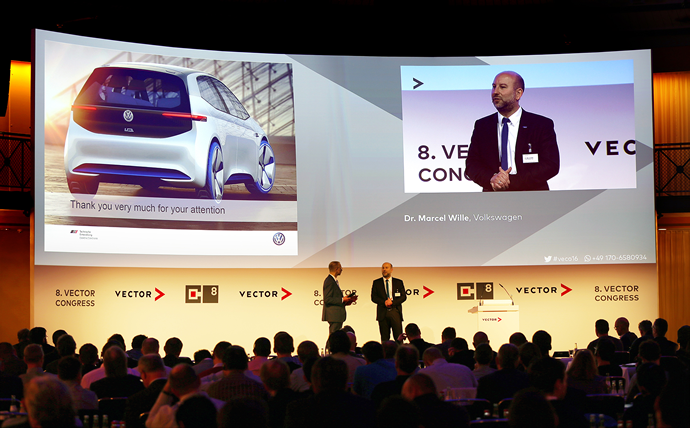Experts look at the future of automotive electronics
Rapidly evolving technology in the automotive market - from autonomous cars and advanced ADAS systems, to truck platooning and vehicle networking - means that many consumers are unsure about what the future holds for the modern day motorists.
However, to allay that uncertainty, a group of industry experts have gathered together in Stuttgart, Germany, to discuss the future of automotive electronics. The Vector Congress, which has taken place every two years since 2002, is organised by and for developers of automotive electronics. The eighth event took place in on 29th November, and was attended by more than 350 participants each day. Through expert presentations by international guest speakers and Vector specialists, they found out about the latest trends and challenges in the fields of ADAS, AUTOSAR Adaptive, Automotive Ethernet, Car2x/V2X, E/E architecture, safety and security, etc. At the accompanying exhibition, Vector specialists demonstrated current products and concrete solutions.
In their presentations, the speakers – including individuals from Baselabs, BMW, Bosch, CSM, CSI, Daimler, Hella, Magna Powertrain, Opel, Porsche, Volkswagen, ZF/TRW and Vector – discussed relevant technical issues faced within the industry, as well as concrete solutions and examples.
Professor Eric Sax from the Karlsruhe Institute of Technology (KIT) opened the event with a keynote speech entitled ‘Harry, bring the car round’. In his presentation, he outlined the current problems of increasingly complex E/E and control device development, and how these require rethinking in the development process. AUTOSAR Adaptive, Cyber Security and Big Data are issues that the industry needs to keep under control, in addition to autonomous driving.
New applications, such as autonomous driving, vehicle-to-X applications and increased vehicle networking, are the main motivation for a new AUTOSAR standard, as Simon Fürst from BMW and Dr. Marcel Wille from Volkswagen demonstrated. In lieu of the static approach of the AUTOSAR Classic Platform, increasingly powerful algorithms demand dynamic system configurability. “Volkswagen will introduce centralised architecture which focuses on the update and upgrade capability of customer applications. As a general software framework, AUTOSAR Adaptive is one of the key elements of this architecture,” said Dr. Marcel Wille.

Security is a (if not the) key aspect in terms of networked cars. Against this backdrop, Lorenz Slansky from Daimler tried to answer the question, ‘Is car IT security standardised?’ On the one hand, standardisation needs more time, and does not necessarily result in a higher level of security. On the other hand, the implementation of standardised processes leads to sophisticated technologies, reduced effort and expenditure, better complexity management and the continuous improvement of security processes.
Dr. Matthias Traub from BMW discussed changes in the development of E/E architecture. He went into detail about the challenges of advanced digitalisation, and spoke about the integration of more effective IT/CE technologies, the consistent reuse of software, and the use of security components to protect network functions.
Robert Faure used the example of Renault to describe how a modern E/E architecture design can be implemented against this backdrop. For this, the Vector E/E engineering tool PREEvision is used, and supports key application areas for the manufacturer. In this context, Faure Concurrent Engineering named communication protocols such as Ethernet and CAN FD, Standards such as ISO 26262 and AUTOSAR, and explained the criteria that led to the selection of these tools.
For ADAS and on the road to autonomous driving, reliable recognition of the vehicle environment plays a crucial role. Holger Löbel of Baselabs demonstrated a way of creating a complete workflow for sensor data infusion in pilot and series development. In addition, in the future, users will only have to configure their data fusion systems, as opposed to programming them.
The ninth Vector Congress in 2018 will be the next opportunity for exchanging experiences with industry experts. Before then, however, Vector Technology Days will take place in Autumn 2017 near Stuttgart – a two-day event on the subject of future oriented hands-on technology, with an extensive exhibition, workshops and presentations.


